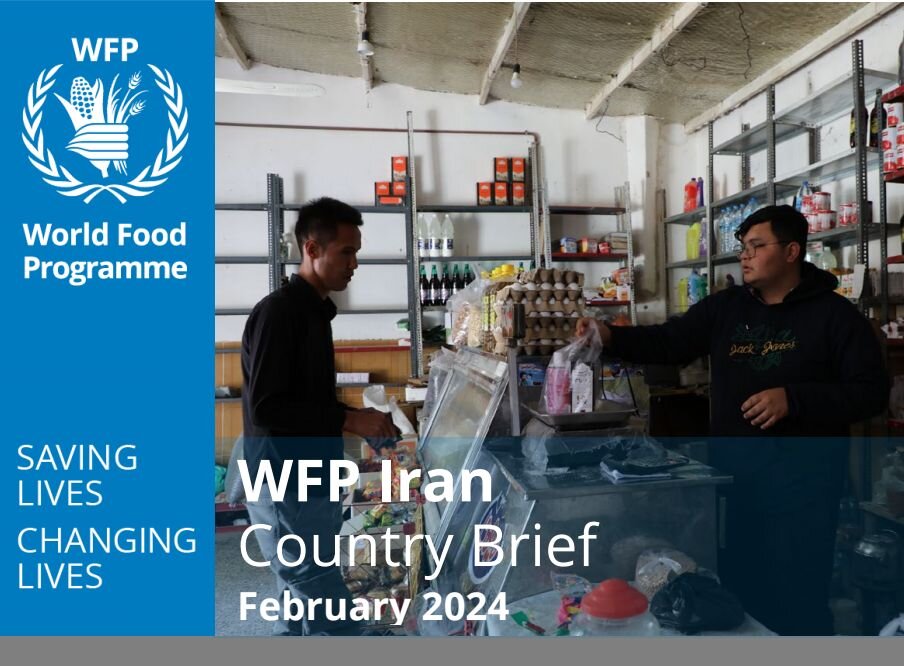WFP releases February report on Iran

TEHRAN –The World Food Program (WFP) has released a report, expounding on activities in Iran over the month of February.
In February, WFP food assistance reached 33,144 beneficiaries, which included Afghan and Iraqi refugees as well as Iranian teachers.
Of those assisted, 28 percent were women, 29 percent were men, 21 percent were girls, and 22 percent were boys.
Refugees are assisted with a staple food basket which includes fortified wheat flour (12 kg per person per month) and vegetable oil (900 ml per person per month), while students and their teachers receive a date bar, and/or fortified biscuits. WFP stopped providing milk-in-school snacks in January 2024 due to funding gaps.
In addition to this in-kind food assistance, WFP provides cash assistance to 7,297 Afghan and Iraqi refugee households each month.
In February, households headed by refugee men received Iranian Rials (IRR) 2 million (US$ 5.1, according to the UN Operational Rate) per person.
Households headed by refugee women received a slightly higher monthly cash allocation, amounting to IRR 2.5 million (US$ 6.3) per person due to limited access to working opportunities, leading to higher food insecurity.
To maintain beneficiaries’ purchasing power amid deteriorating economic conditions, since June 2023, WFP has increased its cash assistance to vulnerable refugee women and men facing serious risks over their food security and well-being.
In February, a total of 9,071 students and their teachers received snacks.
Also, WFP provided 2,734 refugee girls with a cash incentive of IRR 500,000 (US$ 1.3) transferred to their bank accounts.
This is a part of WFP Iran’s efforts to promote education for refugee girls by providing them with cash for each month of regular school attendance.
By February 2024, WFP Iran helped ease the financial burden associated with the glutton-free dietary needs of 48 refugee celiac patients from WFP’s beneficiaries by providing them with an extra cash amount of 7.7 million rials (US$ 20) per person as a replacement for their usual food entitlement.
In February, a total of 21 WFP-supported livelihood activities including welding, tailoring, baking, farming, bag making, and suit making, remained functional and sustained their operations supporting 356 refugees ( 59 percent women and 41 percent men).
Following WFP’s Disability Inclusion Workplan 2023, WFP implemented a pilot initiative in two settlements, Shahid Naseri of Markazi and Mohajerin of Semnan provinces, providing refugees with disabilities a monthly cash top-up of IRR 1 million (US$ 2.6) on top of their regular entitlement. In February, the program successfully reached 101 beneficiaries targeted for assistance.
On April 3, WFP released its 2023 report on Iran based on the interim Country Strategic Plan (2023-2025).
The Islamic Republic of Iran has been hosting millions of Afghan refugees over the past four decades.
According to the report, there are roughly 4.5 million Afghans currently living in Iran.
Around 33,000 of the most vulnerable documented refugees live in 20 settlements in 13 provinces of Iran.
WFP’s response in Iran focuses on addressing the food security needs of the most vulnerable refugees living in settlements.
WFP provides food, education, and livelihood assistance through a hybrid modality of in-kind food, unconditional cash, and capacity strengthening to refugees.
In 2023, WFP Iran was able to secure more than 75 percent of its funding and address the daily food requirements of around 33,000 vulnerable refugees.
In addition to the unconditional assistance provided to around 33,000 refugees inside settlements, WFP also provided conditional support for students attending primary schools and junior high schools.
Through WFP's school meals program, around 8,620 refugee school children (49 percent girls) at primary schools and junior high schools and their 610 Iranian teachers (30 percent women) received nutritious school snacks throughout the scholastic year.
The snacks included fortified milk and either a date bar or whole grain biscuit for every day of school attendance to support their education and nutrition.
Under the same program, around 2,900 girls at primary schools and junior high schools also received cash incentives to support their education in line with girl’s empowerment.
Following the successful establishment of bakeries in some settlements in the past years, WFP supported equipping a bakery in 2023 in one settlement to improve the efficiency of the baking process and the quality of the bread for around 1,400 inhabitants of the settlement.
WFP’s commitment to supporting the government of Iran’s assistance response for crisis-affected populations was further reinforced by WFP ‘s provision of locally procured emergency family food packs to around 9,780 Iranian people affected by an earthquake in Khoy City in May, through its cooperating partner, the Iranian Red Crescent Society (IRCS).
WFP continued to play an active role in the interagency fora such as the United Nations Country Team, the Regional Refugee Response Plan (RRP), and Interagency Cash, Livelihood, Education, and Protection Working Groups.
WFP also continued its cooperation with its non-governmental partners, including UNHCR, IRCS, and International non-governmental organizations (INGOs) such as Relief International and Norwegian Refugee Council, Cooperazione e Sviluppo (Cesvi) across different forums and scopes such as conducting joint Post Distribution Monitoring with UNHCR and attending various interagency working groups.
MT/MG
Leave a Comment